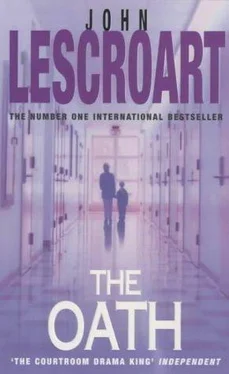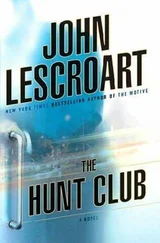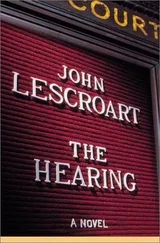"All of them?"
Fisk shrugged and smiled at her. "I don't know. I'm just asking."
Her tongue worked at the ring in her lip. "They might keep a record at the nurses' station-you could ask, although I don't know why they would. The doctors come and go all the time, you know. I think it would kind of depend on a lot of things."
***
To Jack Langtry, the crime scene supervisor, the situation was bizarre.
Just before lunch, Marlene Ash invited him down to her office to discuss Carla Markham. When he arrived, another guy was standing by her, leaning over her desk, examining the scene photos. Langtry could smell lawyers a mile away, and this guy was one. And then Ash said by way of explanation, "Mr. Hardy's representing Dr. Kensing. Lieutenant Glitsky and Mr. Jackman have agreed to cooperate with him in exchange for his client's testimony. He'd like to ask you a few questions."
Langtry didn't know what to make of this, but if Marlene Ash was okay with it, then so was he. "Sure, mate," he said. "No worries."
Hardy's eyes were pinned to the color print of Mrs. Markham's body as it lay when Langtry had first seen her on the kitchen floor. The gun was in the top of the picture. Hardy had his finger on it. "Where'd the gun come from?"
"Lower-left drawer in Markham's desk, which was in the office next to the kitchen. At least that's where the registration was, the ammunition and cleaning stuff. We got a picture of it somewhere in that stack."
"I think I've seen it. Twenty-two, right?"
Langtry lifted his own eyes from the picture, looked in Hardy's face, said nothing.
"You got it in evidence, right? How many rounds did it hold?"
"Six, but there were only five spent casings."
Hardy frowned. "So five shots fired?"
Langtry shrugged-how the hell did he know? "Four dead people, one dog, one round each."
"What are you getting at, Diz?"
Hardy turned to Marlene. "I'm thinking somebody else fired the gun the first five times, then put it in her hand and fired again and took the last casing with him-"
"Where'd the slug go?" Langtry asked.
"I don't know. Out the window?"
"Closed."
"Maybe it was open the night before. How about the kids?" Hardy asked. He flipped a few photos to where they began; then he looked up and away for a moment and sucked in a breath. Langtry felt the same way, sickened again at the sight of them.
"What do you want to know?"
"Just what went down."
While Langtry spent the next few minutes outlining the specifics of the crime, Hardy flipped through the pile of photographs. When Langtry was done, he had another line of questioning. "How loud's a twenty-two revolver?"
"Not too. Nothing like a three five seven. Just a flat pop."
"You shoot one in a house at night, you wake everybody up?"
"I don't know. Maybe not."
"All right. Here's another one. Why would Markham have a twenty-two?"
"I don't know that one, mate. Makes no sense for protection. Wouldn't stop any determined bugger, now, would it? Unless the shot was dead-on. Or point-blank, like these here."
"Okay." He flipped through some more pictures. "If you don't mind, Sergeant, and Marlene, I'd like to see the house."
***
They drove out separately. Langtry met him again at the Markhams' front door, and as he was fiddling with the key, suddenly another man was coming across the lawn from next door, waving at them in a friendly manner. "Excuse me," he said. "I saw you waiting, standing on the stoop here. You should know that nobody…nobody lives here anymore."
"Yes, sir, thanks." Langtry had pulled his wallet and badge, and now showed it to the man. "Police. We know all about it. And you are…?"
"The neighbor from over there. Frank Husic." He motioned toward his own home. "Just keeping an eye out."
"We appreciate it. Thank you," Langtry said. "We're taking another look."
"You go ahead then. Sorry to have bothered you."
"No bother."
Now they were inside, in the kitchen. Hardy stood on the Mexican tiled floor. Warm daylight suffused the room. Through a skylight, the noon sun drew a large and bright rectangle in front of the stove. There was a double-wide window over the sink, a laundry room off the back, well-lit with natural light. A short hallway by the refrigerator-where the dog had been killed-led to a half-glass back door.
Langtry was sitting behind him on a dining room chair that he'd pulled over. Hardy went down to one knee. Rising, he crossed to the sink, undid the latch, and lifted the right-hand window. Stepping sideways, he did the same to the left one, then walked back to where Carla had fallen. "If I'm down here near the ground and put a bullet through either of those windows"-he could have been talking to himself-"I don't hit the house next door. I hit the sky. You want to do me another favor? Stand here in the kitchen a minute."
Langtry did as requested and Hardy went back out through the dining room. His footsteps fell audibly on the central staircase; then his voice carried as he called down, "Count to ten and then call up to me as loud as you can."
After another minute, Hardy was back in the kitchen. "I heard you, but just barely. I was in Ian's room."
"Which means what?"
"It means nobody wakes up while Carla and the dog get shot. It means the dog's shot to shut him up, which is the only thing that makes sense."
"Then why do the kids get shot?"
"He's afraid he's woken somebody up. Either that or the kids knew he was here when they went to bed. Except the kids are asleep. The gunshots didn't carry up. But it's still too risky. So it's Ian first, and he silences the gun with the pillow. Then the girls. How's that sound?"
***
Hardy wasn't going to talk to a witness with a cop there. He followed Langtry for a few blocks, then honked a goodbye and drove back to Markham's street, where he pulled up, parked, got back out of his car, and knocked on Frank Husic's door. The gentleman probably assumed, since he'd been next door with Langtry and his badge, that he, too, was a cop. Hardy let him think so.
Husic invited him in and offered him iced tea, which he accepted. They then went out the back door onto a well-constructed redwood deck. Hardy didn't know when he'd last sat amidst such an explosion of well-tended flowers. Husic had planted them around the deck on the ground, in pots on the deck itself and now in late April they were blooming in profusion. But he'd left an open area in the center of the deck, and in that had placed a wrought-iron table, shaded by a large canvas umbrella. Here they sat in comfortable padded chairs.
From the transcripts he'd read, Hardy knew that Husic was a retired dentist, sixty-two years old. He had a ruddy complexion and cropped gray hair. Today he wore faded navy blue slacks, loafers with no socks, a shirt with a button-down collar, two buttons open at the neck. He came across as solicitous, friendly, intelligent. Hardy made a mental note that, should it come to that, Husic would make a terrific witness.
"Yes, I heard the shot," he said. "It's only a stone's throw away over there. I already told this to the police, you know."
Hardy did know this, but one of the frustrations of his discovery in this matter was the ineptness of some of Fisk's and Bracco's interrogations. He wondered if they'd ever heard of the relatively simple concept of asking witnesses where they'd been, what they'd seen or thought, and what they'd been doing at the time of a murder. This, he thought, was not high-concept police work. And Husic's interrogation-just random chat about flowers and investments, almost nothing about the day of Markham's death-had been one of the worst, he thought.
So he had a lot to fill in here. "I realize that," he replied. "In fact, I've read a transcript of that interview, but I've got a slightly different approach. You just now said 'shot.' You only heard one? I thought I noticed you said 'three' somewhere."
Читать дальше












